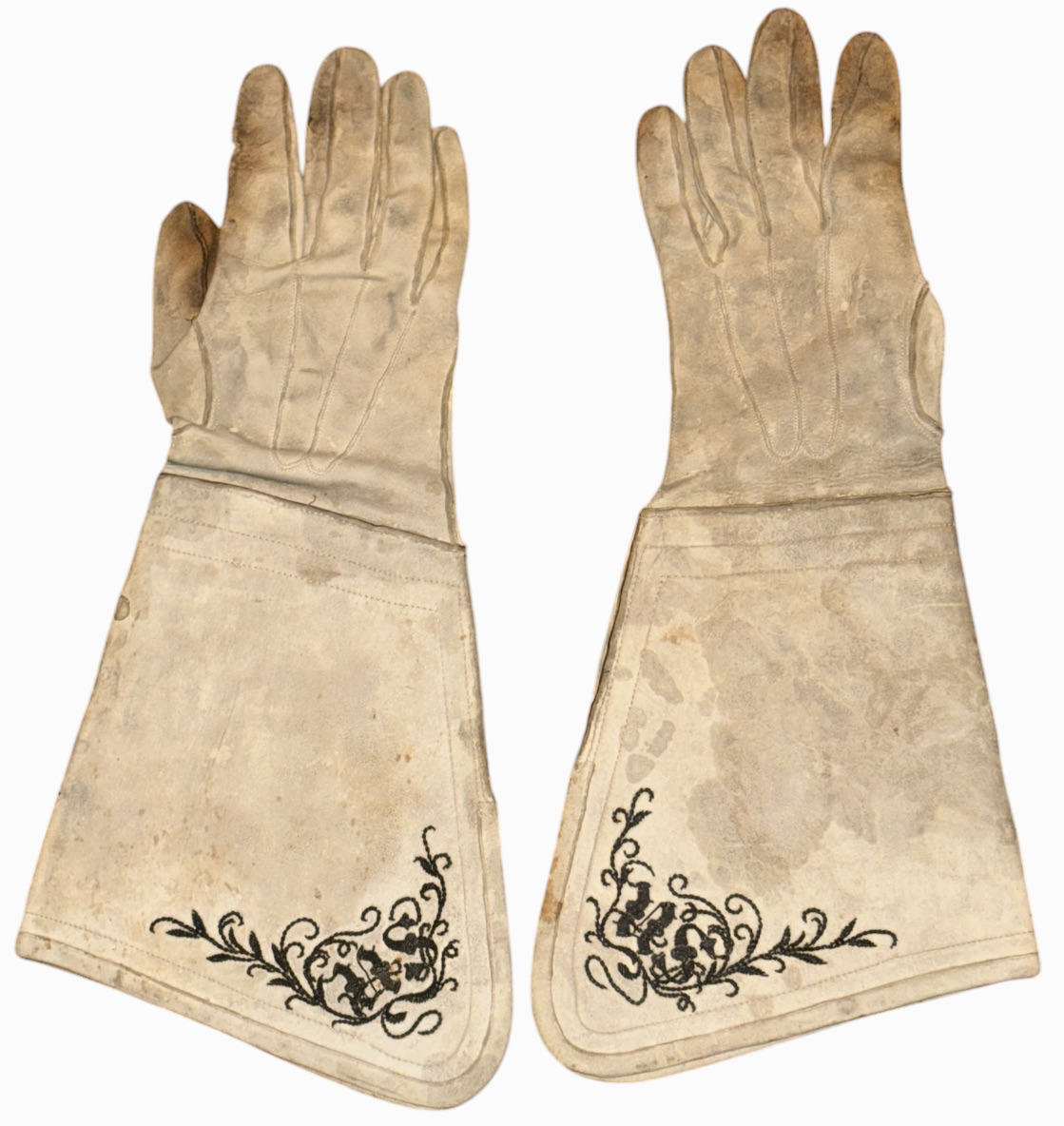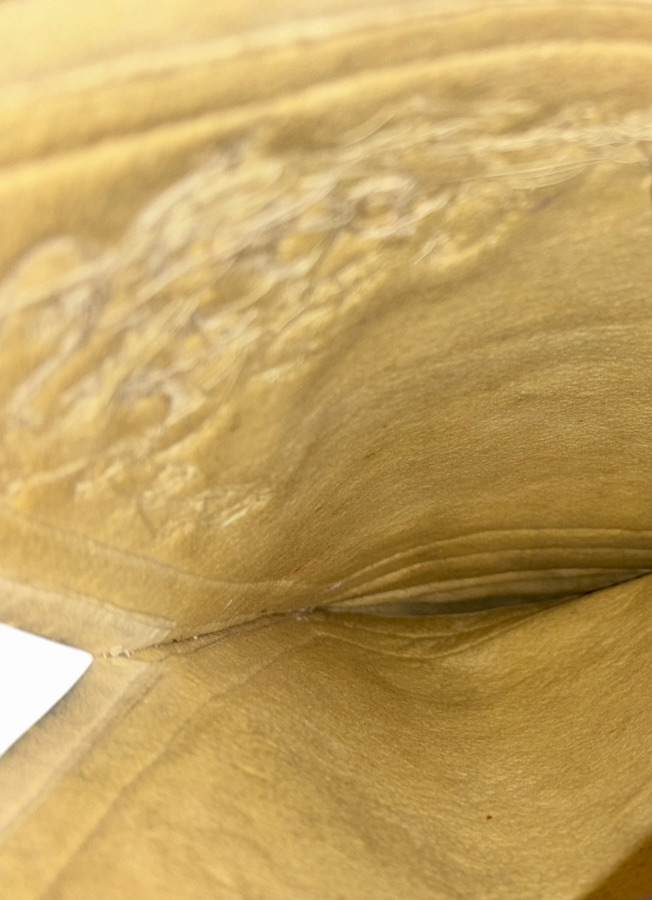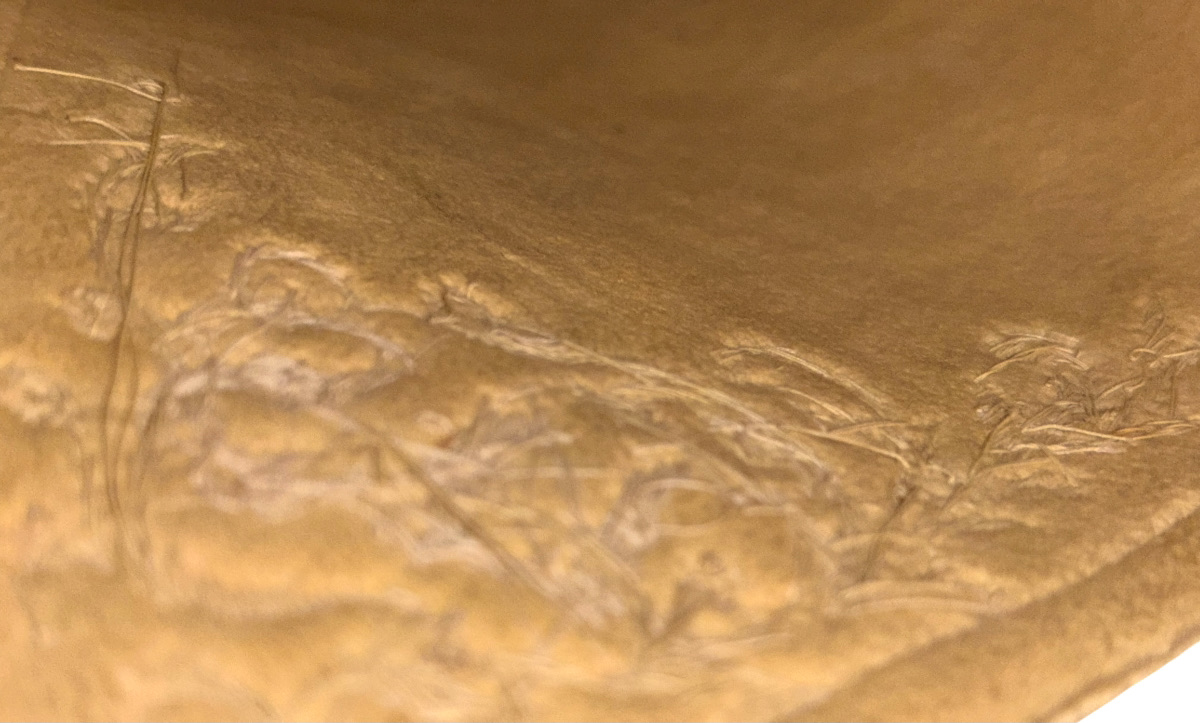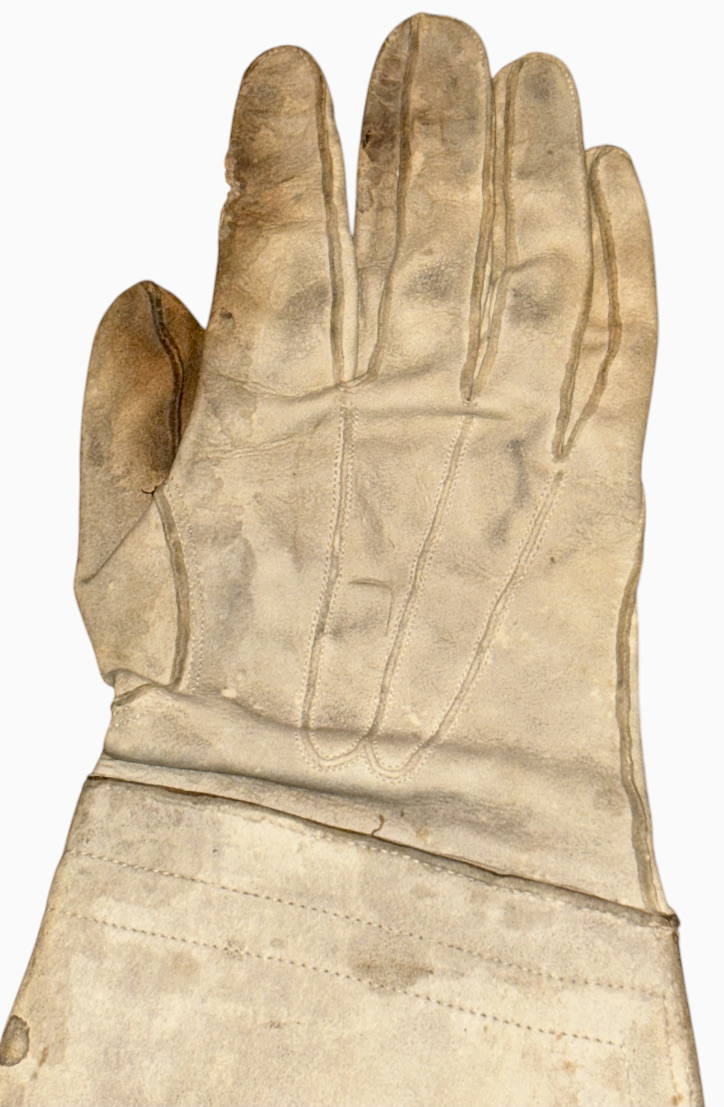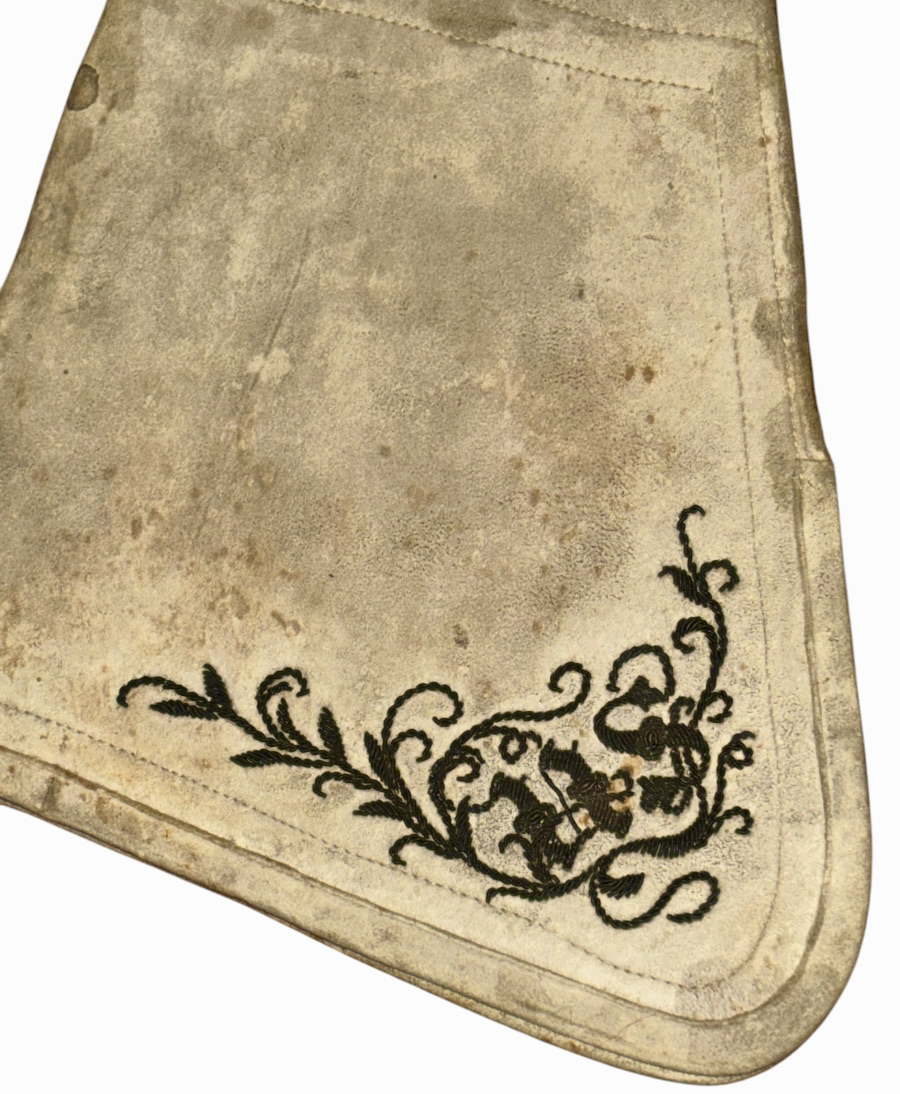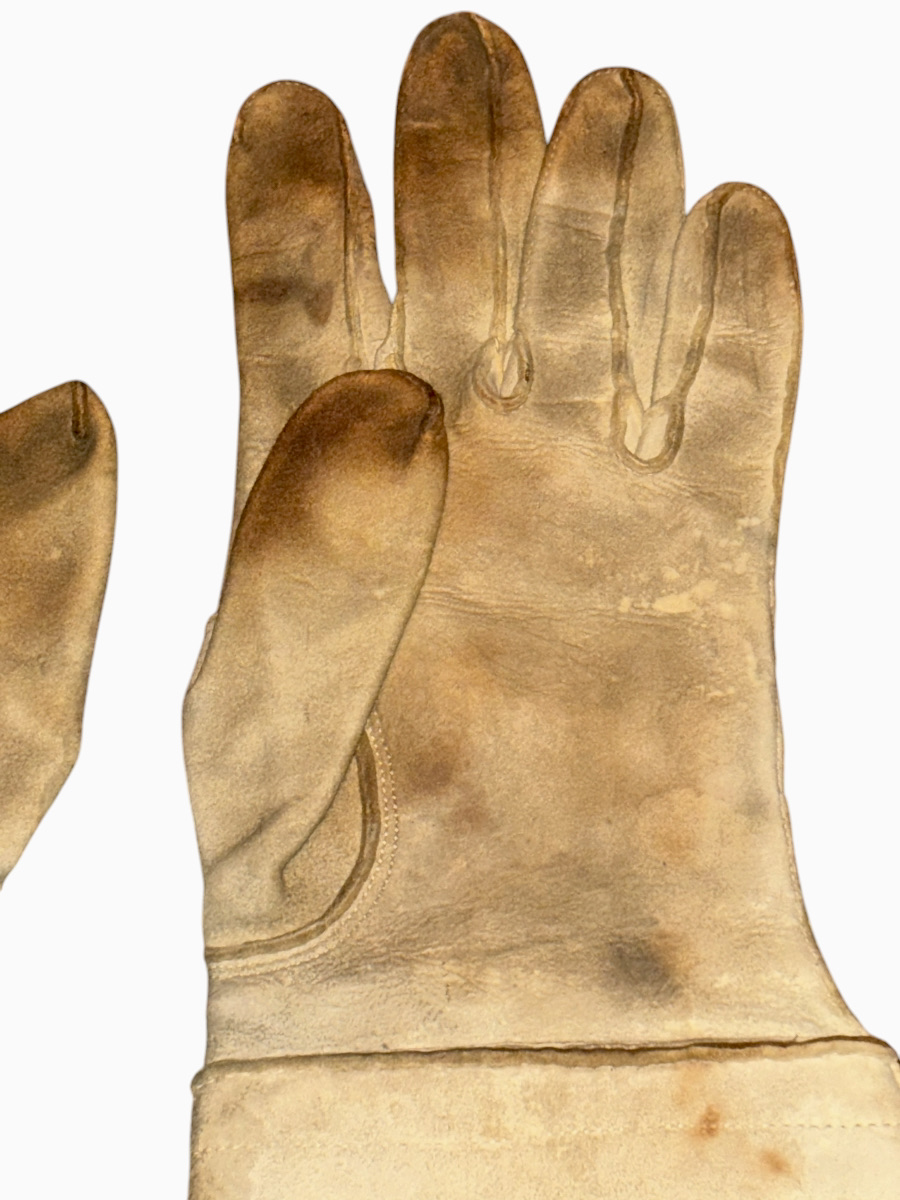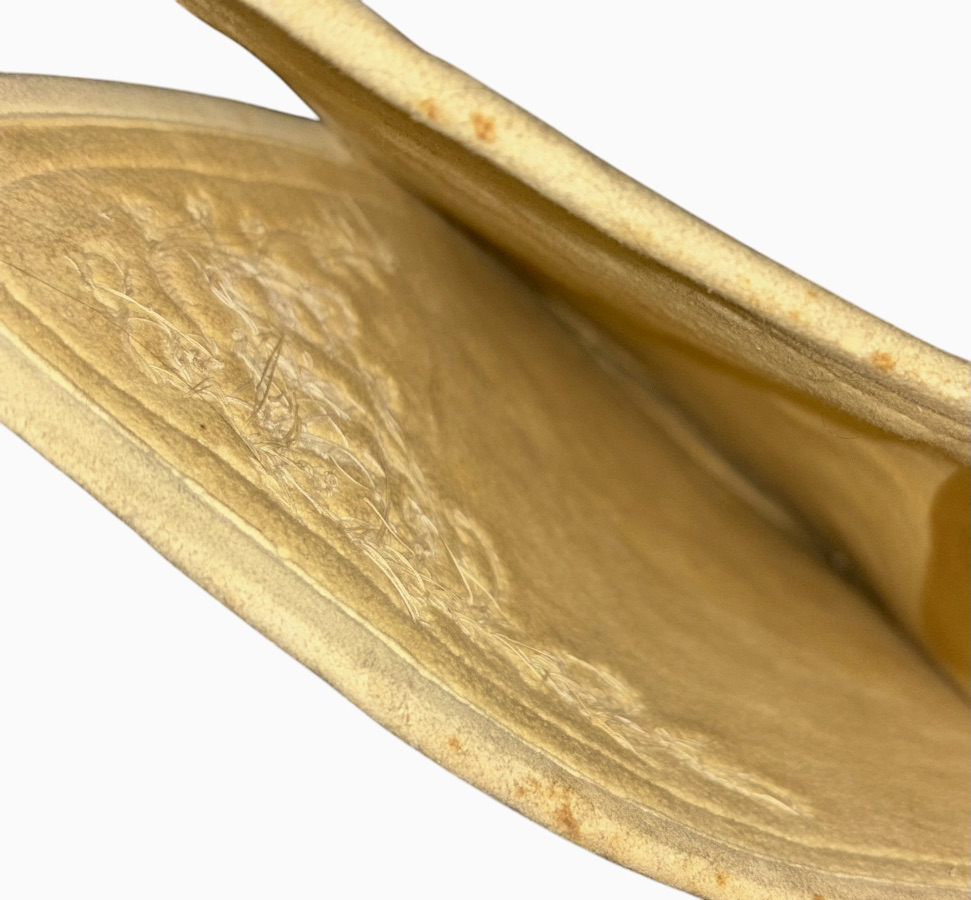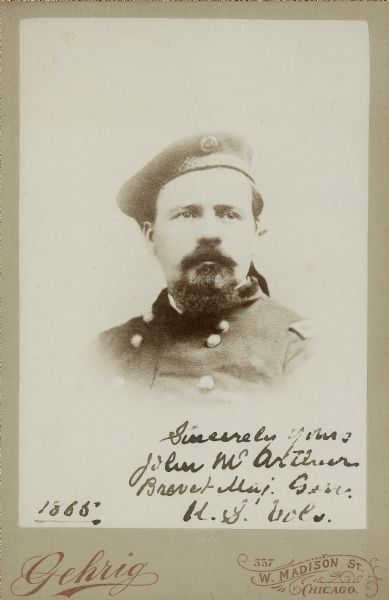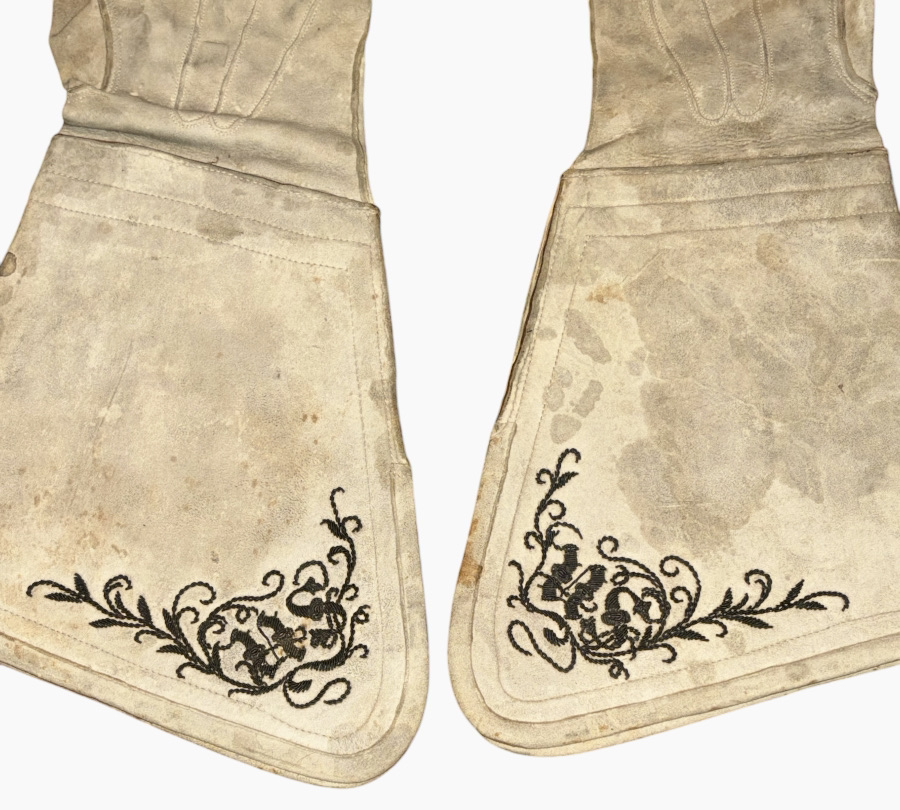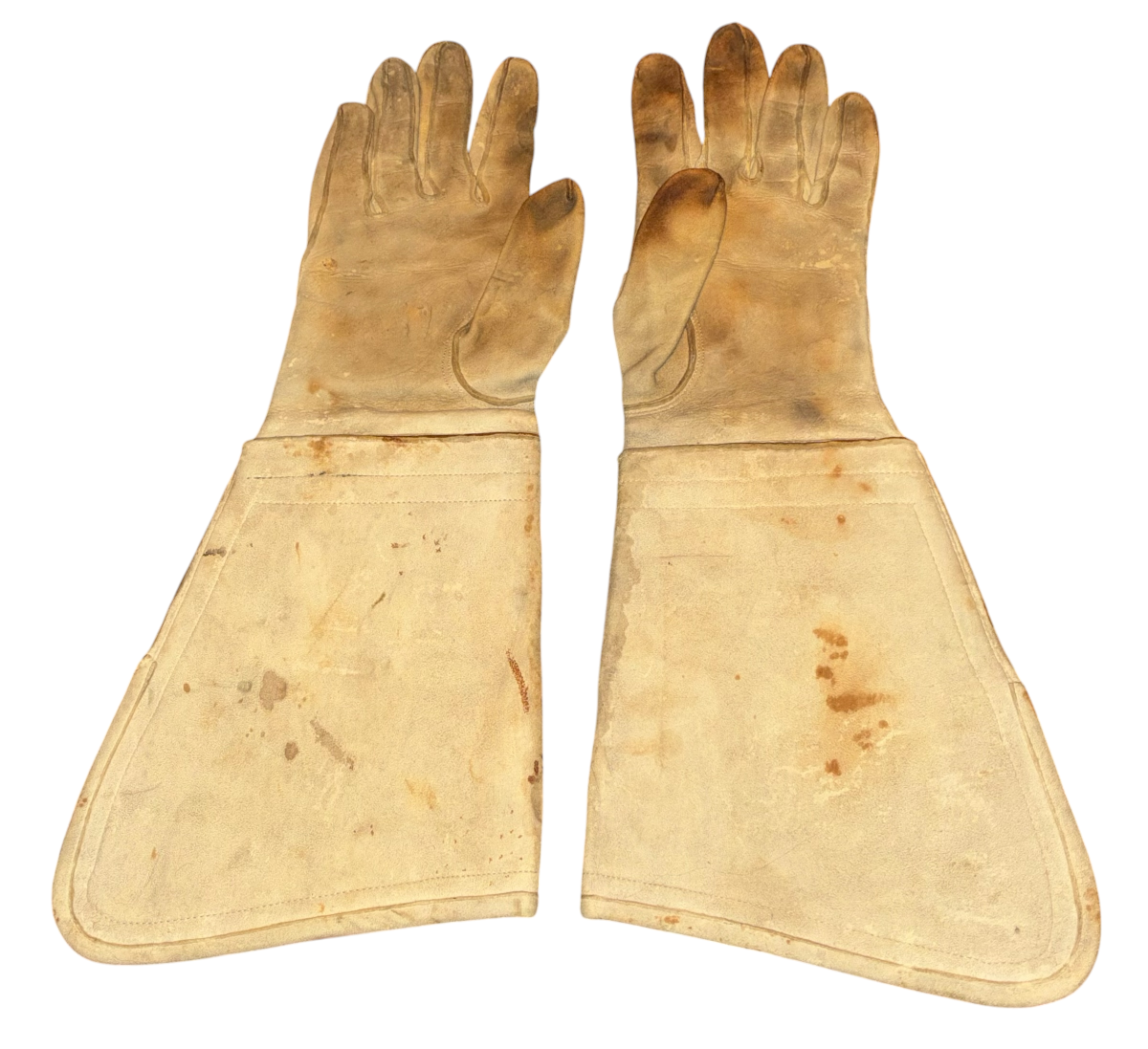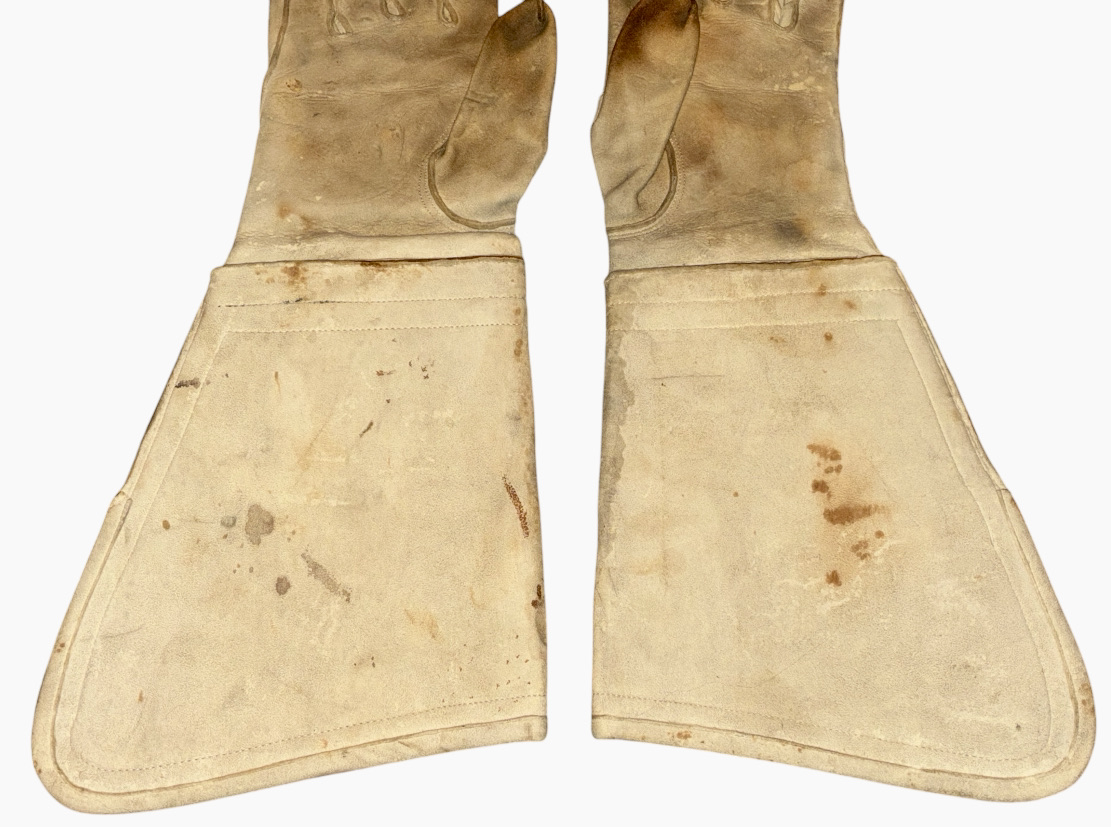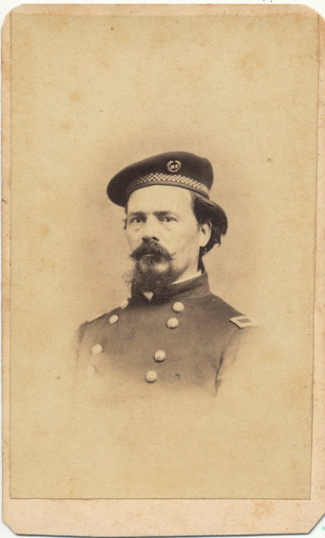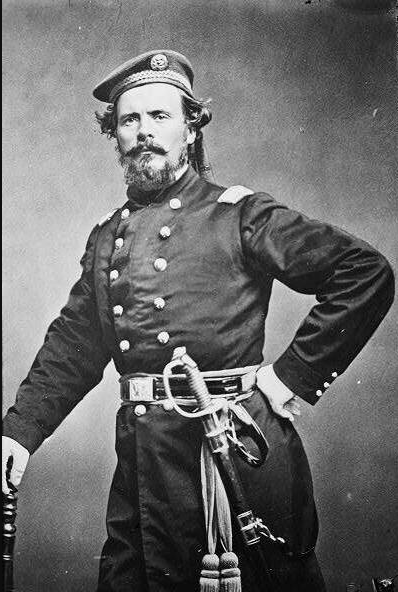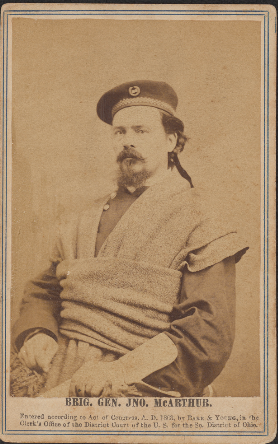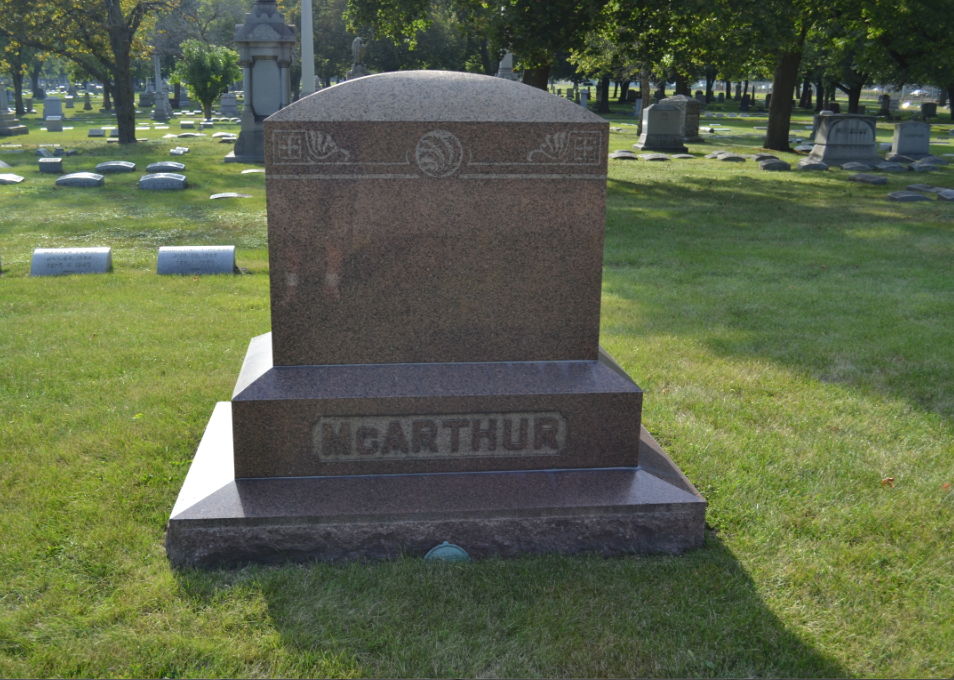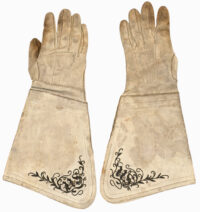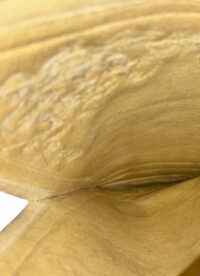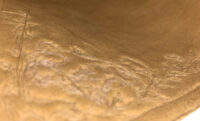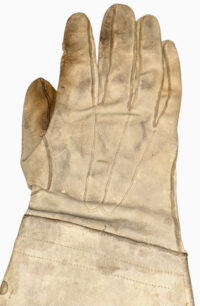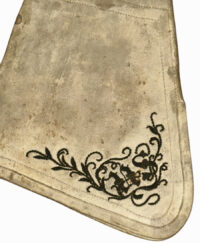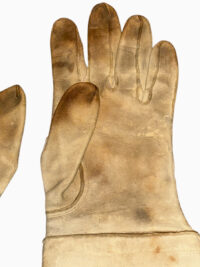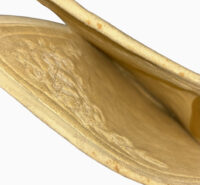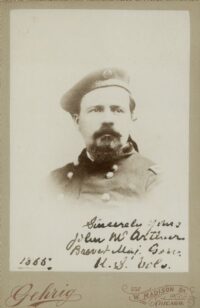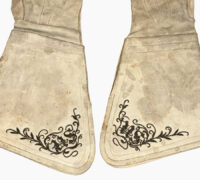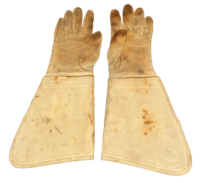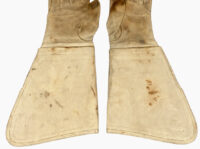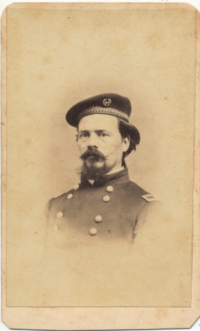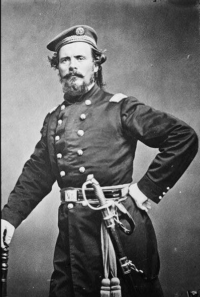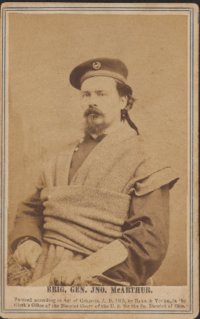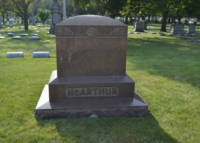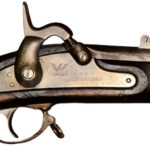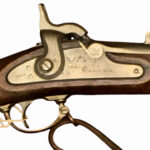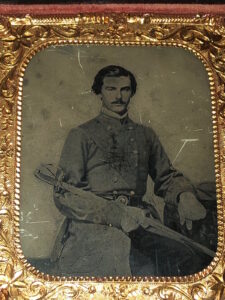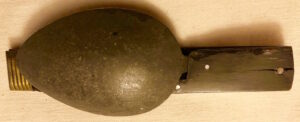$1,250
Fine Quality Civil War Gauntlets Id’d to General John McArthur 2nd Brigade, 2nd Division of the Union Army of the Tennessee – We have had several pairs of Civil War gauntlets, but this pair is the finest quality we have had. Constructed of soft, pliable doeskin, these gauntlets have period-style, wide, lengthy, flared cuffs; at the corner of each cuff is a bullion embroidered, floral, decorative motif – this is a feature that we have not seen before. The gauntlets remain in great condition, but were definitely worn in the field, as they exhibit some staining, but no weak or worn areas. The cuffs are thinly lined with buff colored, soft wool. We obtained these gauntlets from a long-time collector, who had purchased them from renown collector/dealer, Jim Frasca, many years ago. Frasca had obtained the gauntlets from the direct descendants of Gen. John McArthur who served in the Union Army during the Civil War. McArthur had emigrated from Scotland, to the U.S., as a 26 year-old, in 1849, securing employment in the Midwest. At the outbreak of the war, McArthur, as a Scottish native, was a Captain in the “Highland Guards”, a militia regiment in Illinois comprised of Scottish immigrants. Shortly thereafter, McArthur became a Colonel in the 12th Illinois Infantry and served under Gen. Grant at the assault on Ft. Donelson; McArthur was promoted to the rank of Brig. Gen. for gallantry displayed at Ft. Donelson. He would later sustain a wound at the Battle of Shiloh. He would display similar valor throughout the remainder of his military career in the war, serving at the Battles of Corinth, Vicksburg and Nashville and would subsequently be brevetted to the rank of Major General, by the end of his service. These gauntlets are representative of having been worn by a high ranking officer; they are the finest pair we have encountered.
John McArthur 1826 – 1906
Born: 11/17/1826 in Renfrewshire, Scotland
Died: 5/15/1906 in Chicago, IL
Promotions
| Date | To rank | Full/Brevet | Army/Vol | Comments |
| 5/3/1861 | Colonel | Full | Vol | 12th IL Inf (mustered out 08/01/61) |
| 8/1/1861 | Colonel | Full | Vol | 12th IL Inf |
| 3/21/1862 | Brig-Gen | Full | Vol | |
| 12/15/1864 | Major-Gen | Brevet | Vol |
Commands
| From | To | Brigade | Division | Corps | Army |
| 2/1/1862 | 2/17/1862 | 1 | 2 | Military Dist Cairo | Army and Dept of the Tennessee |
| 2/17/1862 | 4/9/1862 | 2 | 2 | District and Army of West Tennessee | |
| 4/9/1862 | 4/14/1862 | 2 | District and Army of West Tennessee | ||
| 5/23/1862 | 7/24/1862 | 1 | 6 | District and Army of West Tennessee | |
| 7/24/1862 | 9/21/1862 | 1 | 6 | Dist of Corinth | District and Army of West Tennessee |
| 9/21/1862 | 10/3/1862 | 6 | Dist of Corinth | District and Army of West Tennessee | |
| 10/3/1862 | 10/6/1862 | 1 | 6 | Dist of Corinth | District and Army of West Tennessee |
| 10/6/1862 | 11/1/1862 | 6 | Dist of Corinth | District and Army of West Tennessee | |
| 11/1/1862 | 12/18/1862 | 6 | Left Wing, 13 | Dept and Army of Tennessee | |
| 12/22/1862 | 1/20/1863 | 6 | 16 | Department of the Tennessee | |
| 1/20/1863 | 7/30/1863 | 6 | 17 | Department of the Tennessee | |
| 9/28/1863 | 10/23/1863 | 1 | 17 | Department of the Tennessee | |
| 4/15/1864 | 9/27/1864 | Post of Vicksburg | Dist of Vicksburg | Department of the Tennessee | |
| 11/3/1864 | 12/5/1864 | 1 | 16 | Department of the Tennessee | |
| 12/5/1864 | 2/18/1865 | 1 | Detachment Army TN | Department of Cumberland | |
| 2/18/1865 | 7/20/1865 | 1 | 16 | Army and Dept of the Gulf |
JOHN MCARTHUR McArthur, John, brigadier-general, was born in Erskine, Scotland Nov. 17, 1826. He attended the public schools and worked in his father’s blacksmith shop until 1849, when he immigrated to America and, locating in Chicago, Ill., secured employment as a boiler-maker and afterwards established a business of his own. He was captain of the “Highland Guards” attached to the state militia, and in 1861 this company volunteered and became part of the 12th Ill. regiment, of which he became colonel on May 3, 1861. He commanded a brigade under Grant at the assault on Fort Donelson in Feb., 1862, and for his gallantry was promoted brigadier-general on March 21 following. At Shiloh he received a wound in the foot during the first day’s fight, but returned to the battle after the wound had been dressed and succeeded to the command of the 2nd division after Gen. William H. L. Wallace was mortally wounded. He commanded a brigade at Corinth, Oct. 3-4, 1862, and the 6th division, 17th army corps, Army of the Tennessee, during the Vicksburg campaign, May 1, 1863, to July 4, 1863. At the battle of Nashville, where he commanded a division under Gen. A. J. Smith, he took a conspicuous part and distinguished himself by gallantry, leading his division in the assault of the salient point in the enemy’s line after Gen. Couch had refused the privilege of charging. For this he was brevetted major-general of volunteers, Dec. 15, 1864. He was mustered out of the service, Aug. 24, 1865, and returned to Chicago, where he was president of the board of commissioners of public works during the fire of 1871, and postmaster of the city from 1873-77.
Civil War Union Brigadier General John McArthur – Born in Scotland, he learned the blacksmithing trade before immigrating to the United States in 1849. Settling in Chicago, Illinois, he worked first as a boilermaker before founding the Excelsior Iron Works with his brother-in-law, serving as it’s proprietor. When the Civil War broke out in April of 1861, he helped recruit an infantry regiment that drew it’s ranks largely from Chicago’s Scottish community. When the regiment was mustered into Federal service as the 12th Illinois Volunteer Infantry, John McArthur was appointed it’s Colonel and commander on August 1, 1861. He led his unit until January 1862, when he was advanced to brigade command. His abilities were tested in the February 1862 Battle of Fort Donaldson, where his out-positioned brigade suffered heavily in the face of a Confederate breakout attempt, but retired in an orderly manner. Promoted to Brigadier General, US Volunteers on March 21, 1862, he was in command of the Union Army of the Tennessee’s 2nd Brigade of the 2nd Division at the April 1862 Battle of Shiloh, where he was wounded. He returned from his wounds to the field in time to lead his troops at the May 1862 First Battle of Corinth. Advanced to Division command and sent to the Army of the Mississippi under Major General William S. Rosecrans, a mistake in orders found him temporarily without a command during the October 1862 2nd Battle of Corinth. When the mistake was discovered, he was assigned to command a brigade during the battle. Eventually returned to command of the VI Division, XVII Corps, Army of the Tennessee, he would lead it through the balance of the war, fighting with his men in the Spring-Summer 1863 Vicksburg Campaign, in the December 1864 Battle of Nashville, and in the April 1865 capture of Fort Blakely, Alabama. Brevetted Major General, US Volunteers to date from December 15, 1864 for his service in the Battle of Nashville, he was honorably mustered out of service on August 24, 1865. After returning to civilian life, General McArthur struggled with career challenges. His iron business did not succeed, and his position as Chicago public works commissioner ended after the October 1871 Great Chicago Fire. He served as Postmaster of Chicago, but was found culpable for losing $73,000 of postal funds in a bank failure. He died in Chicago, Illinois in 1906.
| BORN: 1826 in Erskine, SCOTLAND. DIED: 1906 in Chicago, IL. CAMPAIGNS: Fort Henry, Fort Donelson, Shiloh, Iuka, Corinth, Vicksburg, Nashville. HIGHEST RANK ACHIEVED: Brigadier General. (Was brevetted Major General, but was not appointed Major General of volunteers.) |
| BIOGRAPHY |
| John McArthur was born in Erskine, Scotland, on November 17, 1826. He studied smithing and ironwork, immigrated to the United States in 1849. McArthur worked in Chicago as a boilermaker, then began the Excelsior Iron Works with his brother-in-law. In 1861, he was the sole owner of the company, and was active in the state militia’s Highland Guard. In May of 1861, he became colonel of the 12th Illinois Infantry. He fought in engagements and battles in places including Fort Henry and Fort Donelson. Promoted to brigadier general on March 21, 1862; he took part in the Battle of Shiloh, in which he was wounded. As divisional commander, he led troops at Iuka, Corinth and in the Vicksburg Campaign and Siege. He was brevetted a major general for his service in the Battle of Nashville, and was assigned to the Army of the Gulf for the rest of the war. He left the military in August f 1865, and returned to his iron business. It did poorly, and McArthur’s position as Chicago public works commissioner ended after the Chicago fire. He was postmaster of Chicago, but was found culpable for losing $73,000 of postal funds in a bank failure. After retiring, McArthur died Chicago, on May 15, 1906. |
John McArthur (general)
| John McArthur | |
| Born | November 17, 1826 Erskine, Scotland |
| Died | May 15, 1906 (aged 79) Chicago, Illinois |
| Place of burial | Rosehill Cemetery |
| Allegiance | United States · Union |
| Service / branch | United States Army |
| Years of service | 1861–1865 |
| Rank | |
| Commands | 12th Illinois Volunteer Infantry |
| Battles / wars | American Civil War |
| Signature | |
John McArthur (November 17, 1826 – May 15, 1906) was a Union general during the American Civil War. McArthur became one of the most capable Federal commanders in the Western Theater.[1]
Early life
McArthur was born in Erskine, Scotland. He learned to be a blacksmith and emigrated to the United States at age 23 and settled in Chicago. He was the proprietor of the Excelsior Iron Works.[2] He also served in the Chicago Highland Guards militia unit.
Civil War
Following the outbreak of the Civil War, McArthur was appointed colonel of the 12th Illinois Volunteer Infantry. Shortly after, he was elevated to command the 1st Brigade in Brig. Gen. Charles F. Smith‘s division and saw action at the Battle of Fort Donelson. Even though Smith’s division was deployed on the left flank of the Union line, McArthur’s brigade was detached to John A. McClernand‘s division to extend the right flank toward the Cumberland River. McArthur’s brigade was never positioned correctly and when the Confederates made their breakout attempt, McArthur and Richard J. Oglesby‘s neighboring brigade suffered heavily. Despite this both brigades withdrew in relatively good order.
Following Fort Donelson, McArthur was promoted to brigadier general on March 21, 1862, and led the 2nd Brigade, 2nd Division of the Army of the Tennessee at the Battle of Shiloh. Members of his brigade wore Scottish caps and were thus nicknamed the “Highland Brigade”.[1] McArthur was wounded leading his brigade in a breakout of the Confederate encirclement on the first day of Shiloh. He led his brigade during the following Siege of Corinth.[3]
Following the capture of Corinth, McArthur took command of the 6th Division and was ordered to reinforce Maj. Gen. William S. Rosecrans‘s Army of Mississippi, stationed at Corinth. On the eve of the Battle of Corinth, Brigadier General Thomas J. McKean arrived from St. Louis and due to his rank superseded McArthur in command of the division. Orders were given placing McKean in command of the division but no orders were given to reassign McArthur. Therefore, McArthur was without a command for a brief period but remained close at hand; even helping Colonel John M. Oliver position the pickets for his neighboring brigade.[4] A staff officer at Rosecrans’s headquarters remembered McArthur’s predicament and a special order was immediately sent out returning McArthur to command of the 1st Brigade, 6th Division, which had recently been commanded by Colonel Benjamin Allen while McArthur was in divisional command.[5]
After Corinth, McArthur returned to command the 6th Division, now part of the XVII Corps. He led it during the Siege of Vicksburg and commanded the post at Vicksburg after the Confederate surrender. He was in command of the 1st Division, XVI Corps and was involved in the pursuit of Sterling Price‘s Missouri Raid. His division was transferred with the rest of the corps to Tennessee, where his troops played a significant role in breaking the Confederate lines on the second day of the Battle of Nashville. He received a brevet promotion to major general of volunteers for his actions in that battle.[2] He also led his division into action at the Battle of Fort Blakeley.[6]
Postbellum life
McArthur’s grave at Rosehill Cemetery
After the war, he was involved in a number of occupations, including Commissioner of Chicago Public Works during the Chicago Fire, postmaster of Chicago, and general manager of the Chicago and Vert Island Stone Company.[7] In 1875, he was elected as a member of the American Philosophical Society.[8]
McArthur died in Chicago on May 15, 1906, and was buried at Rosehill Cemetery.[9]
John McArthur Veteran Famous memorial
Birth
17 Nov 1826
Erskine, Renfrewshire, Scotland
Death
15 May 1906 (aged 79)
Chicago, Cook County, Illinois, USA
Burial
Rosehill Cemetery and Mausoleum
Chicago, Cook County, Illinois, USA
